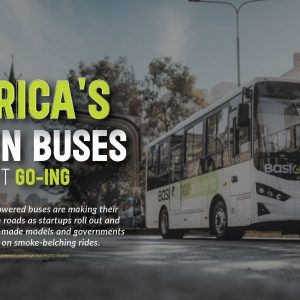More electric-powered buses are making their way onto African roads as startups roll out and scale their locally-made models, while governments crack down on smoke-belching rides.
By Conrad Onyango, bird story agency
Hundreds of electric buses will hit African roads by the end of the year as different countries start to replace large public transport vehicles with internal combustion engines.
On the eve of the 27th United Nations Conference of the Parties on Climate Change (COP 27), Egypt, the host country, is to roll out 70 electric buses at a cost of 17 million US dollars.
The North African country’s Ministry of State for Military Production and the Ministry of Local Development signed a joint agreement for the acquisition of the buses, christened ‘Setibus’, in July 2022.
Manufacturing Commercial Vehicles (MCV), an Egyptian manufacturer, is producing the vehicles in the country ahead of their official roll out in the resort town of Sharm El Sheikh, where COP 27 will be hosted between November 7 – 18.
“Work is in full swing for the climate conference, and there will be a fleet of electric and gas-powered buses and electric cars that will be operated during and after the climate conference,” Egypt Today quoted Egypt’s Minister of Local Development, Mahmoud Shaarawy.
Research firm, Mordor Intelligence, said that African countries have been helped by the rising number of startups and foreign car makers in the nascent industry.
Growth of green buses
“E-buses are becoming a commercially viable solution for public transport (although it is still more costly than diesel buses), and in addition to that, they have zero exhaust emissions,” said Mordor intelligence in its Africa Electric Bus Market 2022-2027 report.
Traditional urban transportation buses account for approximately 25 per cent of the total emission by the transportation sector in Africa. Mordor Intelligence is projecting higher emissions due to the growing preference for public transport, seen to add 26,000 tons of carbon by 2030.
“Local governments, along with various other partners, are actively putting their plan for the adoption of electric buses in the future,” said Mordor Intelligence in the report.
Efforts being put in Kenya
After a four-month pilot, Kenyan startup, BasiGo, has announced plans to introduce 20 electric buses by the close of 2022, increasing to 100 next year and reaching 1,000 units by 2030.
“They have been running 50,000 kilometres in total. We have proved the concept, and the technology is able to work and survive in Kenya and Nairobi for now. Come 2025, our target to have 1,000 buses running in Kenya is possible. What we need is electric power, and that is available,” said BasiGo Head of Business Development, Samuel Kamunya, during the Kenya Power Expo 2022 in early July.
In June, Kenya’s electricity producer, Kenya Electricity Generating Company (KenGen), began installing charging stations that will power the electric batteries of at least 50,000 buses and two million motorbikes.
“E-mobility is the fastest way for Kenya to make its energy transition like many other countries. It is also a key element in reducing pollution by promoting the use of vehicles that will reduce reliance on diesel and petrol,” said KenGen’s Managing Director, Rebecca Miano.
Kamunya said that one of the biggest reasons why electric vehicles make sense in Kenya is because more than 90 per cent of the power generated in Kenya is renewable.
Currently, Kenya has two active electric bus startups; BasiGo – which locally assembles buses made by the Chinese firm, Build Your Dreams (BYD) Automotive – and a Swedish-Kenyan electric vehicles startup, Roam (formerly Opibus).
Roam was the first company to put its electric buses on the road, with a pilot programme that started in January 2022, with plans to roll out commercially mid-year.
“Following this, the platform will be tested at scale in commercial deployment of 10 buses during the second half of 2022,” said Roam Project coordinator of Public Transport, Dennis Wakaba, in a statement.
Efforts being put in South Africa
In South Africa, Rheinmetall, a German-headquartered automotive and arms manufacturer, has begun phasing out 350 internal combustion vehicles with the introduction of electrically powered buses. E-Bakkies, e-scooters and e-bikes also form part of the package to support green transport within and outside its plant.
A 12-month pilot study for two electric buses by Cape Town-based Golden Arrow Bus Services (GABS), is also coming to a close, raising hopes for mass rollout by this South Africa’s large mass transit intra-city bus service company. The electric buses were manufactured by BYD and the pilot was launched in July 2021.
Rwanda has also cast its eye on a shift to electric buses, with plans to roll out incentives to local manufacturers of vehicle parts and charging equipment.
bird story agency
Also Read: Ride-Hailing Services Find Success in Africa; Will This Help the Drivers?





